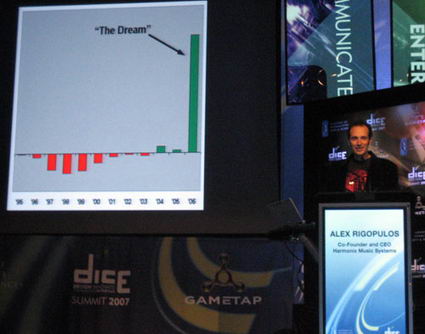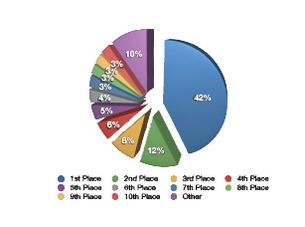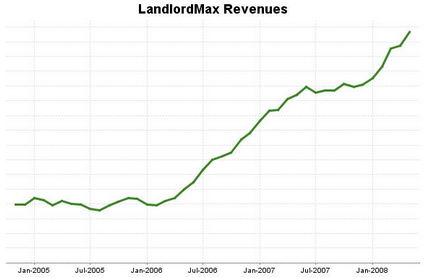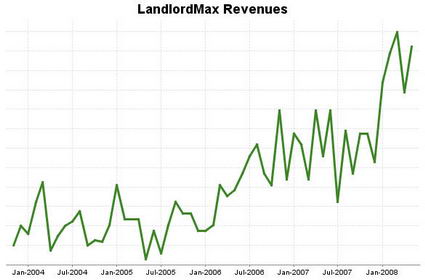The Implications of Your Decisions
Yesterday I came across an article on The Register about the anti-virus software AVG. To quote The Register:
In late February, AVG paired its updated anti-virus engine with a real-time malware scanner that vets search engine results before you click on them. If you search Google, for instance, this LinkScanner automatically visits each address that turns up on Google’s results page.
This has two very large implications, especially when you consider that more than 20 million people have downloaded AVG. And as you can imagine, it has to do with the bandwidth.
Let’s take an example of what happens when you go to Google and search for “latest movies”. In the past you would go to Google’s search page, enter in your search, and get some results. Then when you clicked on one of those search results you would go to that page. Simple, and it’s what you would expect.
However if you have the latest version of AVG installed something else happens. You start the same way, go to Google, enter in your search term (“latest movies”) and click on the Search button. However here is where things change for the worse. AVG looks at the search results and behind the scenes starts to download each and every search result webpage. This is without you having to view or visit the webpage, it’s all happening behind the scenes.
Why is this bad? Because most ISPs (Internet Service Providers) limit how much bandwidth you can use per month. It might be very high for some people, but now imagine that for every search you do, you visit 10 webpages (the default number of search results on most search engines). Even if you don’t look at any of the search results. You’ve basically increased your bandwidth consumption by ten times for every Google search!!! And not just Google, for all search engines, including Yahoo, MSN, etc. Your bandwidth usage has just significantly increased, by multiples.
But it gets worse. What if the webpages AVG decides to check out behind the scenes aren’t just simple pages but rather webpages rich in media that include videos, images, and so on? You’re bandwidth will be consumed in no time. And what if you have more than one computer on your network? What if you have 2-3 computers in your home? If everyone is searching at the same time you can imagine that your network will get slower because everyone is trying to load multiple webpages at the same time. And don’t even get me started on corporate networks. I can’t imagine the increased load on a corporate network with 10-1000 users!!! For that reason alone I suspect corporations will stop using AVG, the bandwidth usage is just too expensive.
And right now this is only officially happening for search engine results, but what if one day they decide to continue down this path and do this for every webpage? I’d hate to see the bandwidth usage on that decision! Most websites have more than 10 links on them! The front page of this blog probably has closer to a 100 links than 10 links on it. So instead of 10 times as much bandwidth, you’re looking at 10-100 times! You’ll be eating up your bandwidth cap each month. And corporate networks will crawl to a halt.
But what about the websites themselves? The websites you visit might also significantly slow down. Let’s take an example using the assumption that AVG visited every link on every page to amplify the issue (even without this assumption, on some search terms the increase in traffic can be very significant). When You go to my company’s website LandlordMax, the landing page (the first page) has at least 20 links. The navigation alone is about 10 links. That means our servers now would have to be able to handle 20 times as much capacity to handle the same number of users (assuming they all used AVG). That is, every person who comes to our website would not just download the first webpage, but instead they would download 20 webpages. And each time they clicked on a link, they would get another 20+ pages. We’d have to increase our server capacity by 20 times. That’s very expensive, and where do you think that cost would have to eventually be offset? Into the price.
But assuming it doesn’t get to this level, right now for every search term we get listed on the first page, we’ll basically get hit with a webpage request. So for example, if the search term “latest movies” get 10,000 searches a month (from people using AVG), and we’re listed anywhere on the first page, we’ll have to handle 10,000 webpage requests even though only a percentage of that search traffic will come to our site as shown in the above graph. Who’s going to pay for all that bandwidth? It’s certainly not AVG! It’s both you the user of AVG and the website owner.
It gets even more interesting, assuming bandwidth is free. In the example above, let’s say it’s now your website and you’re the 10th search result listing, at the very bottom of the first page. In this case you can expect to get about 3% of the traffic, or using our example of 10,000, 300 visitors a month. Now, with the new AVG system, you can expect this number to dramatically increase. Instead of just 3% or 300 visitors a month, you’ll get 100% of the traffic, a full 10,000 visitors a month. That will greatly skew your web metrics and webserver needs. In this example you’ve just increased your traffic (and hence server capacity needs) by almost 3 orders of magnitude! This will affect how you run your website/business. If nothing else, it will increase your costs which means it will have to be offset somehow (usually an increase in price for the customer).
Above this, a lot of the decisions for online businesses are derived from the web metrics. With this new system the metrics of your visitors are now completely useless. The 10,000 visitors a month mean nothing. They don’t represent the true scale of traffic. You’ve basically lost the ability to determine what works and what doesn’t. Although I won’t get into the details here, let’s just say that this means you can no longer correctly determine when and why you have a “real” increase in traffic. It’s all masked in a barrage of fake traffic. And because your web metrics are useless, your marketing now becomes guesses in the dark. Which then means more dollars have to be spent to make the same amount of money. Again this will eventually have to be offset into the price of the products/services on your website.
In any case, this appears to be a very good example of a lose-lose scenario. No one wins. Of course it’s not as drastic as I’m making it out to be, AVG only accounts for at most 20 million users. But it’s very important to realize that this is a significant amount of users. It’s enough that not only have consumers begun to take notice, but many websites are also starting to report significant increases in traffic and bandwidth due to this issue.
What’s really irritating about all this is AVG’s Chief of Research (Thompson) response according to the Register:
And if that causes problems for webmasters, Thompson says, so be it. “I don’t want to sound flip about this, but if you want to make omelets, you have to break some eggs.”
Be careful of the implications of your decision. This may result in a very large community backlash, especially when it’s backed by a large number of webmasters. We all remember the Intel processor fiasco of 1993, commonly referred to as one of the biggest technical blunders of all time.
And on that note I’ll leave you with some after-thoughts to ponder.
- What happens if the search result returns another search result (this could be maliciously implemented)?
- You’re now exposed for exploits from every website on the search results, not just the ones you visit.
- What’s your monhtly bandwidth cap?
- What will be the performance impacts on your machine for continually scanning all those extra webpages for viruses, spyware, and malware?
Permalink to this article Discussions (6)
How to Generate Traffic to Your Website – Andy Brice Review
Earlier this month Andy Brice of Successful Software wrote a review of my ebook How to Generate Traffic to Your Website. The following is a quick highlight of Andy’s review:
“On the whole I think it is a very good introduction to marketing websites. At 136 pages there is plenty of ‘meat’ and a good balance between depth and breadth of coverage. Steph illustrates many of the topics with his own real-world experience with landlordmax.com.”
You can read his full review here. Thanks Andy for taking the time to review the book.
For those of you who are just hearing about this ebook for the first time, you can read the first 21 pages free here. You can also find several more reviews here. And if you’d like you can purchase it right now.
Permalink to this article Discussions (0)
The Secret to Success Can be Summed up in One Word: Perseverance!

[Image courtesy of Jeff Atwood from Coding Horror]
Success is about a lot of things, but without perseverance none of them matter. Being smart really helps, but it doesn’t guarantee success. Many very brilliant people can’t successfully start companies, and many not so brilliant people have runaway successes. Luck can help, but it can’t stay with you forever. You can only be lucky for so long.
Honestly is there any other one single thing that can help you achieve success as consistently as perseverance? NO! Everything else, luck, money, intelligence, can help, but none of them will be as powerful as perseverance.
Learning to be successful takes time, effort, and energy. It’s the ability to keep on going through thick and thin. It’s the ability to not abandon when most other people would. It’s the ability to learn from your mistakes and continually improve. Or to use my favorite quote from Eddie Cantor “It takes 20 years to make an overnight success.”. I couldn’t agree more.
A great example of overcoming perseverance comes from the company Harmonix, makers of the wildly successful and famous video game Guitar Heroes. It took Harmonix 10 full years of development and improvements to build this series of games and achieve success. The graph at the top of this post really shows you the perseverance the folks at Harmonix had to keep pushing on. Sure they had revenues, but they also had negative profits. It would have been very easy to quit, but they kept on pushing.
If you ask most people today about the Guitar Heroes series, they’ve only learned about it in the last while with the release of Guitar Heroes 2. That’s when it really started to get some traction. And recently with Guitar Heroes 3 and Rock Band going mainstream, just about everyone knows about them. How many of you played, seen, or even heard of the original Guitar Heroes (version 1) game?
As a side note, Harmonix developed Guitar Heroes 2 for RedOctane, but not the latest Guitar Heroes 3 game. Without getting into the details, Harmonix was acquired by MTV in 2006, and as part of its first project it developed the other major competing game to Guitar Heroes 3 called Rock Band (Guitar Heroes 3 was developed for RedOctane by another company). Rock Band of course became a large success. A major part of their success with Rock Band was because of all the knowledge they had acquired over their years learning how to build Guitar Heroes, Dance Dance Revolutions, and so on. In other words, because of their perseverance. Perseverance really pays off!
I’ll give you another great example, my own company LandlordMax. If you look at the graph just above, it’s a 12 month moving average of our sales revenues (with the first 12 months missing to be able to get the first average). As you can see, we had almost no growth in 2005 according to this graph. Although I could’ve sworn we did, it tells me otherwise (a moving average graph acts as a way to smoothen the data points).
In other words, it basically took us two years to really get LandlordMax going. Sure it’s not nearly as long as ten years for Harmonix, but how many of you would keep at it for 2 years before seeing any significant growth? That’s with 3 major version releases (not counting the initial 1.00 release).
Perseverance is the key to success! It took us a while to get the “right” features into LandlordMax, to fully understand what our users really wanted. It took Harmonix many years to get the “right” music software, the “right” polish. Once they understood it though, it didn’t take them very long at all to create another completely new game (Rock Band) and achieve the same success with it. Learning how to succeed takes time and perseverance. It takes commitment and effort.
As the movie Run Fatboy Run asks, what will you do when you hit the “wall”? Will you push through it or give up and go home?
PS: If you haven’t already read it, I recommend reading Jeff’s somewhat related post Living the Dream: Rock Band. It’s about the importance of putting the user’s goals at the forefront of your business. And it’s also the inspiration that initiated this post.
Permalink to this article Discussions (6)
Interview the Pros – Update
As many of you already know, I’m in the process of getting a book published called Interview the Pros: What does it take to create a Successful Blog? which consists of 40 interviews with many prominent bloggers and will be available on Amazon, Barnes & Nobles, and so on. The good news is that I’ve just finished sending the final review/edit of the book to my publisher earlier this week. I’m now in the process of working with them on the book’s cover copy (the wording on the cover, back, inserts). We’re also in the process of working through the illustrations for the cover, and what have you. As far as I understand, this next step could take up to 5 weeks.
The book’s already been assigned it own ISBN, which is pretty cool! It will be available in both hard cover and soft cover, In addition to this I’m in the process of building up a website for the book which should be available for its release. I’d share the link but it’s not yet ready.
All in all things are progressing. It’s not as fast as I’m used to in the blogging and technical world, but I’ve been informed that for a traditionally published book is pretty fast, which is good news.
I’ll keep you posted with updates as they become available.
For those of you who are new to this blog (the readership is growing quite rapidly), the list of people interviewed for the book are:
- Aaron Wall from SEO Book
- Ades Tynyshev from Ades Blog
- Al Carlton from Coolest-Gadgets.com
- Alex Papadimoulis of Worse Than Failure
- Andy Brice of Success Software
- Anita Campbell from Small Business Trends
- Asha Dornfest from Parent Hacks
- Ben Casnocha
- Ben Yoskovitz of Instigator Blog
- Bob Walsh author from 47 Hats
- Dan Lyons from The Secret Diary of Steve Jobs
- Dane Carlson from Dane Carlson’s Business Opportunities Weblog
- David Armano from Logic+Emotion
- David Seah
- Derek Semmler
- Dharmesh Shah from On Startups
- Eric Sink
- Ian Landsman of Userscape
- James and Alex Turnbull from Google Sightseeing
- JD from Get Rich Slowly
- Jeff Atwood of Coding Horror
- Jeff Clavier from Jeff Clavier’s Software Only
- Jennette Fulda from Half of Me
- Jenny from 101 Reasons I Hate Being Fat!
- Jessamyn West of Librarian.net
- Joel Cheesman from Cheezhead
- Jonathan Snook
- Manolo from Manolo’s Shoe Blog
- Neil Patel from Quick Sprout
- Pamela Slim from Escape from Cubicle Nation
- Patrick McKenzie from Micro ISV on a Shoestring
- Penelope Trunk of Brazen Careerist
- Ramit Sethi from I will Teach You to be Rich
- Rob Walling from Software By Rob
- Rohit Bhargava from Influential Marketing Blog
- Seth Godin
- Stephane Grenier of Follow Steph (me)
- Steve Rubel from Micro Persuasion
- Trent Hamm from The Simple Dollar
- Yaro Starak from Entrepreneur’s Journey
Permalink to this article Discussions (3)
Top 16 Podcasts
Recently I purchased myself an iTouch, and I have to say it’s an amazing little device. My only complaint so far is that I purchased the 16Gb rather than the 32Gb (I always seem to be running out of room because of all the podcasts I load up on it). Actually, that’s not really true, I’m finding that iTunes on Windows is another of my complaints, it’s an extreme CPU hog. Just downloading files often brings the CPU usage to 100%. Who knows why…
In any case, here’s my current list of the best podcasts I was able to find:
Marketing
Software Development
- IT Conversations
- Software Engineering Radio
- StackOverFlow
- Java Posse
- IBM developerWorks
- UIE Brain Sparks
Technology and Science
General
Some of these podcasts are obviously better than others, but overall I’ve enjoyed almost every podcasts from every single one of these sources. If I had to pick my favorites, they would be Ted Talks (the speakers at Ted are just amazing – I can’t say enough about these video podcasts), Internet Marketing Insider, StackOverFlow, Software Engineering Radio, and Java Posse. I’d also like to include IT Conversations in this list but it’s still too new to me. And don’t get me wrong, the others are great, these just happen to be the best of the best.
And if I’ve missed your podcast, or if you know of other great podcasts, please don’t hesitate to comment below. I’m always on the lookout for great podcasts, especially video based podcasts (video casts).
Permalink to this article Discussions (0)
Status Update
Normally in the past I’ve posted updates about what we’re doing here at LandlordMax (as well as my other projects) every six months to a year. Well I’m now going to try to increase that frequency to every 2-3 months. I’m doing this because it forces me to look more frequently at our successes and failures in detail. I always do some checks each month, but by forcing myself to post about the more interesting metrics on a regular basis will force me to look deeper into these metrics. Hopefully finding some great nuggets of information along the way.
Firstly, the most exciting and good news is our traffic metrics at LandlordMax. Our traffic, as measured in by unique visitors, has increased by a whopping of 108% in the last 6 months!! That’s our biggest success as it is translating into more sales.
As well our revenue growth is continuing to be very positive, which is great to see. For those of you who are fairly new here, in early April I posted a graph of our sales revenues over the last few years. In that graph there was somewhat of a spike in 2008. I’m glad to report it wasn’t just a one-off spike for January and February, it’s a consistent growth in revenue. May is already looking like another very big month, possibly the biggest yet!
I decided to also push the data further and generate a moving average graph using a 12 month trailing period (which is why the first 12 months are missing from this graph). I have to admit I was surprised with the results, it’s much better than I expected! As you can see below, we’re definitely moving in the right direction. The real estate bust is not hampering our growth, so it’s not all bad news out there. It’s definitely not all doom and gloom for everyone as you can clearly see.
Some other interesting news, FollowSteph is still growing at a very good pace. In the last 6 months the traffic on this blog has grown by 46% which is great. Although I was hoping to more than double it every 6 months, I can’t complain with this growth rate. The good news is that the RSS feed subscription rate has grown much faster than that, it’s pretty doubled in the same amount of time.
As for the book Interview the Pros: What does it take to create a Successful Blog?, it’s still being edited by my publisher. These things take time, which I have to admit is excruiating for me. I like to have things moving, I’m not a big fan of waiting. But the good news is that the book already has it’s own official ISBN number assigned to it. And most of the book’s cover and back copy is ready to go. It’s going to be available in both as a soft and hard cover book. I’ll let you all know as soon as the editing phase is done, which hopefully will be sooner than later. As well I have to finish the website for the book pretty soon, so I can start to do some pre-marketing. I’ll let you all know when the website is available.
As for the ebook I wrote How to Generate Traffic to Your Website it’s done fairly well overall. I have to admit I was hoping for better results, but this topic seems to be saturated with lower quality ebooks. In other words a lot of people are suspicious of all books on this topic because of some bad experiences, so you really have to push hard to make the sale which isn’t really where I want to be (I don’t want to compete with the long spammy sales letters). However what’s been really interested is that ALL the reviews it’s gotten have been favorable! And each time a review came out there was definitely a spike in sales. But between reviews it’s pretty quiet. So I’m looking into what are my options for the future of this ebook…
Otherwise everything else is moving along very well. The biggest item is that we’re always working very hard on releasing the next major version of LandlordMax as soon as possible, which is coming together very nicely. Just extremely busy as usual.
Permalink to this article Discussions (6)
Why You Should Never Publish Anything Late at Night When You're Tired
I broke one of my own golden rules last night, never ever release or publish anything late at night when you’re tired. If you do the odds of making a mistake greatly increase. And unfortunately last night I broke this rule and a mistake did happen. Luckily for me the mistake was minor, but it helped to reinforce what I should have already known.
You see I published my latest blog entry How Much is it Worth to You? after midnight last night. Although I often stay up much later than midnight, I’ve been going to bed earlier in the last while to catch up on some much needed sleep. In any case, the issue is that I was tired and it was late for me that particular night. Normally in these cases I still go ahead and “publish” the article, but I set the “publish time” to be sometime the next day.
I do this because of several reasons, the biggest reason being that I’ll have had some time to rest and be more awake before it gets publicly released. In some cases I’ve had the time to rethink parts of my post and add more information, sometimes adjust the example, and so on. But overall it’s prevented me a few times from making silly and stupid mistakes.
Well last night I went ahead and pushed the publish button, deciding that I’d break my own golden rule just this one time. And this was my mistake!
Some of you might have noticed it, but I think I caught it before most of you did. What happened is that when I wrote the article I initially left the headline blank. I often do this because I couldn’t think of a good headline at the time I wrote the article. In these cases I just continue writing and come back to the headline later.
Last night I forgot to come back later and write my blog post headline. I left it blank. Above the title being blank, it also meant that my RSS feed subject line was blank. No so bad for a starting blog, but as you get bigger it will be noticed by more and more people. Like I said before, this was not a major issue, but it definitely brought the point of my golden rule home. Plus it’s better to fall and learn (or in this case re-learn) from smaller mistakes than from your larger mistakes.
And don’t think this doesn’t happen to large companies releasing major new versions of their software. To give you an example, early on in my programming career, long before I started LandlordMax, at least 10-15 years ago, I worked for a company where a short workday was 12 hours. And that included weekends (this alone has the makings of a DailyWTF written all over it). As you can imagine we were living in a perpetually tired state. Come release time there was even more pressure to work harder and longer hours. And I did, after all this was very early in my career and I didn’t know any better.
Well the obvious happened. Something eventually went wrong one day. Although I can’t remember the details any more, it’s all a big blur, but I do remember one major release that we’d been working particularly hard to get out the door. We’re talking barely enough time to go home to shower and eat at night (or should I say the wee hours of the morning), never mind sleep. Well eventually we made a mistake, and it was a bigger one. On release night, after what we thought was exhaustive coding and testing, we felt like the current release candidate was ready to go. We decided to release it. We were done. Phew. So we performed one last final build to run one last final test round on (remember this is a time before automated tests were mainstream). And we released it. Exhausted we all went home to catch a few hours of sleep.
Unfortunately within a few hours we were all called right back into the office. Our released version had a major bug. I wish I could remember what it was exactly, but I can’t. To be honest I suspect my brain has intentionally forgotten about it. In any case it was broken and customers were complaining. All hell was breaking loose.
Being already tired really didn’t help to resolve this issue quickly. But lady luck was on our side because it was a very simple mistake and we were able to fix it very quickly (I think it was something like the wrong language properties file was being picked up in the wrong build). So simple a mistake that had we released it in a waken state, well even in a just non-exhausted state, it would never have happened. As soon as we re-released it the phones stopped ringing and we were able to finally get some sleep.
Never ever release when you’re tired. But more importantly, had the issue been a complex or hard one to resolve we would have been in a lot of trouble. Having your development team completely exhausted trying to fix a critical and complex bug during a firestorm is an incredibly dumb place to put yourself into. Would you want to have triple heart by-bass surgery performed on you while you were in the middle of a heart attack by a surgeon who had slept only a few hours in the last week and was living completely on caffeine? Especially when there’s no need for it to be like this.
You can’t win every time, but stack the odds in your favor! Be smart about it. Don’t make my mistake. And you can be sure I won’t break this golden rule again, at least not for a very very long time.
Permalink to this article Discussions (5)
How Much is it Worth to You?
Today as I was going through my RSS feeds I came across a very interesting post on I Will Teach You to be Rich by Ramit Sethi, which coincidently is one of the bloggers I interviewed for my upcoming book Interview the Pros: What does it take to create a successful blog?.
Although the title of his post drew me in (Why the lady sitting next to me should pay $2,000 for a computer class), what really caught my attention was:
If you take a $2,000 computer class and it lets you get a job with a $10,000 salary bump, you should do it. No question.
If you buy one book per week, for $20 each, that’s $1,000 per year. If you get one good idea per week, my friend Paul told me, it’s worth it. If you apply that idea, I can’t even guess how much it would be worth.
I especially like the second paragraph. I’m a very strong believer in reading books (and GOOD blogs for that matter – where good means it has value to you). As a personal goal I try to read one book a week, but I suspect it’s closer to one book every 1-3 weeks. In any case, I’ve found that I can average out at least one great idea per book, generally much more. Not all books are equal of course, some books offer incredible value whereas others are pretty much useless. However as an average I find the ROI for books to be very high which is why I continue to buy them. For example today I just bought a new book, albeit a technical one, called GWT in Action: Easy Ajax with the Google Web Toolkit.
Anyways getting back to the topic at hand, as Ramit says:
Of course, the excuses will come. I don’t have that kind of money. (Answer: Save up.) How do I know if the class will get me that better job? I could probably take the same class for $100 somewhere else. All this stuff is free online, anyway.
I couldn’t have said it better. And I especially like Ramit’s last example excuse: “All this stuff is free online”. I absolutely unequivocally agree, you can get information for just about anything online for free, assuming your time is worth nothing. Not only that, the net is full of misinformation, which can cost you much more than free!
But let’s get back to this free thing. How long do you think it will take you to find all the information you want? It definitely will take you a lot longer than reading a book. Above this, will it all be fluid and coherent. That is, will the material flow and make sense or will you be struggling and fighting with the material to make sense of it all because it will come in pieces that you have to combine together, all fragmented from different online sources.
How much is your time worth? $20? $30? I honestly would rather spend the few bucks it takes to get all the material combined and nicely packaged into a book than spend days and weeks just trying to bring it all together, piece out what’s what, what’s right, what’s wrong, what’s obsolete, what’s duplicated, etc. The ROI of a book is generally worth it!
If I compare the amount of effort I spent to get my ebook on how to generate traffic to your website, well I can guarantee you that even if you make minimum wage the ROI will be positive. It took me weeks to months to put it all together, and that’s not counting the time it took for me to become knowledgeable on this topic. I can’t imagine someone starting from scratch.
Or what about my upcoming book on how to blog? I’ve spent over 500 hours just interviewing 40 bloggers and putting it all together in a book. And above that it’s being professionally edited right now. Sure you could probably dig through these bloggers blogs to find most (most, but not all) of the information they gave in their interviews, but how long would it take you?
And that’s the key to success; look for opportunities that will bring you more value than what you paid for them. This includes everything and anything: books, courses, conferences, etc. As Ramit put it himself, they key to success is “if the value exceeds the cost, do it.” It’s as plain and simple as that!
**Update: It recently came to my attention that the original idea for this post came from a lunch time conversation between Paul Singh and Ramit Sethi. If you also want to see Paul’s take on this idea you can find his post titled The Best Way to Spend $20, Today at Results Junkies.
Permalink to this article Discussions (7)










